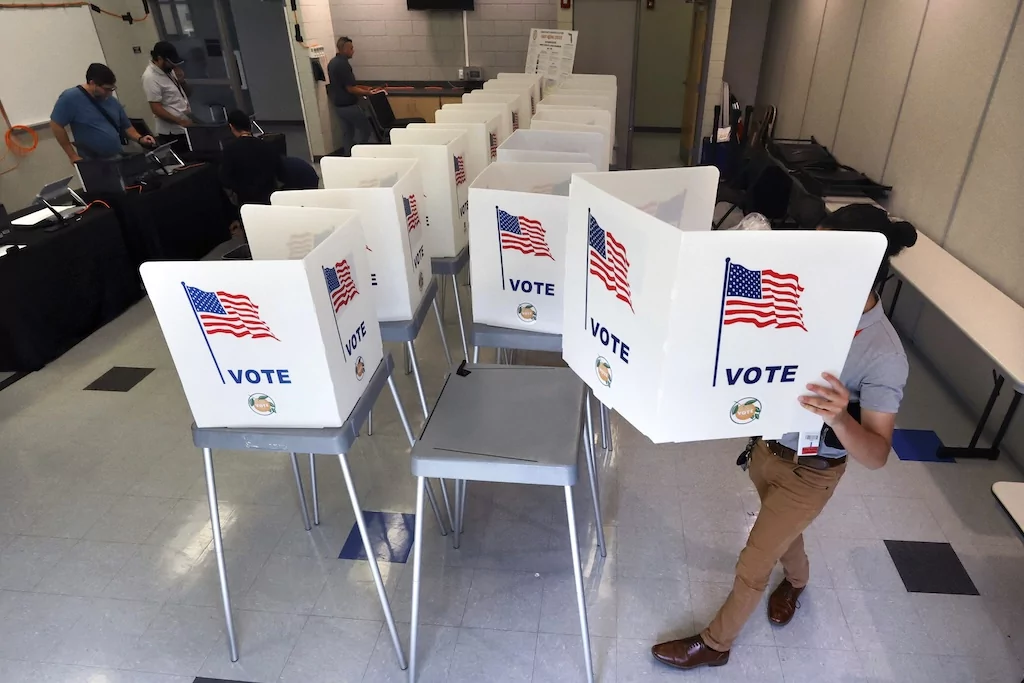

Fights between Republicans and Democrats about election fairness have been playing out in court all year in anticipation of the 2024 election. Some of the disputes have seen resolutions, but others remain pending or could be yet to come.
Republicans have generally fought to combat voter fraud, while Democrats have focused more on expanding ballot access, two competing missions that have resulted in dozens of lawsuits.
These fights come amid the Republican National Committee, in particular, putting on a show of force this year by filing at least 135 lawsuits across more than two dozen states. The RNC has striven to match the 2020 prowess of Democrats, who have been powered in part by the prominent left-wing election attorney Marc Elias.
2024 ELECTIONS LIVE UPDATES: LATEST NEWS ON THE TRUMP-HARRIS PRESIDENTIAL RACE
Elias, for his part, has been meticulously tracking cases and said Friday that there were more than 200 election-related cases that were still pending with less than one week until the election.
While Democrats have accused Republicans of attempting to suppress voters or cast doubt on the forthcoming election results, RNC Chairman Michael Whatley told reporters this week that his priority was strictly about election integrity and that the RNC’s litigation has focused on four key areas.
“One, only American citizens can vote. It is the law of the land, and we need the states to enforce that. Two, we want voter ID in place everywhere we can. Three, states must clean up their voter rolls. And four, in states that have mail-in balloting or absentee balloting, we want basic protections in place on the mail-in ballots,” Whatley said.
“This is not election denialism. This is not a conspiracy theory. These are basic protections that are widely supported,” he said.
Below is a look at top legal battles and investigations to look out for heading into Election Day. They include open matters, as well as ones that have concluded but that a campaign could use as fodder if displeased with an election outcome.
Pennsylvania mail-in ballots with missing or incorrect dates
The Republican National Committee and Pennsylvania GOP asked the Pennsylvania Supreme Court to halt an order by a lower court that allowed Philadelphia County to count 69 votes that were cast in a special election this year by way of mail-in ballots with missing or wrong dates on their outer envelopes.
The Republicans warned in their emergency request to the state’s highest court that ballot counting in Pennsylvania, a critical swing state that could decide the presidential race or tip the balance of power in the Senate, was thrust into a state of uncertainty because of the lower court’s ruling.
BALLOT CURING: EVERYTHING TO KNOW ABOUT FIXING DEFECTIVE MAIL-IN VOTES
The Republicans demanded immediate statewide clarity. Outside of Philadelphia, the 66 other counties in the state may now see the ruling as a free pass to count mail-in votes on Tuesday even if the outer envelopes are missing dates or are dated erroneously, they argued.
“A county board of elections, or multiple county board of elections, likewise may now seek to change the result of a race in the 2024 General Election — such as the nationwide race for President or control of the U.S. Senate — under the majority’s order,” the Republicans’ attorneys warned.
Democrats opposed the RNC and state Republicans’ request, saying that while they agreed the Pennsylvania Supreme Court should rule quickly, it should decide that the date on the outer envelope “serves no purpose” and should, therefore, not be the reason a voter is disenfranchised.
Pennsylvania provisional ballots
The RNC and Pennsylvania GOP have asked the U.S. Supreme Court to block a ruling by the left-leaning Pennsylvania Supreme Court that allowed anyone who turned in a mail-in ballot with deficiencies to cast a provisional ballot on Election Day instead.
Democrats have argued this should be allowed statewide, while Republicans say it defies state law that gives individual counties discretion on how to handle letting voters fix, or cure, mail-in ballots with problems, such as missing signatures.
Pennsylvania counties investigate batches of fraudulent voter registration applications
At least four counties in Pennsylvania have announced in the weeks leading up to the election that they identified fraudulent or potentially fraudulent applications to register to vote.
Lancaster, Monroe, York, and Cambria counties all reported discovering these applications. County officials said that they were caught as part of routine checks of the forms and emphasized that they were not fraudulent ballots, but rather applications to receive ballots.
Monroe County District Attorney Mike Mancuso said in a post on social media that election officials intercepted 30 such forms with irregularities, some of which he confirmed were fraudulent. He said his office traced them to an Arizona-based company called Fieldcorps but that a broader investigation remained open.
Lancaster County District Attorney Heather Adams said in a press conference this week that election officials in her county received 2,500 voter registration applications, all with similar features, such as the same handwriting.
Adams said she could confirm that at least 60% of them were fraudulent and that in the preliminary phase of her investigation, she could confirm that they appeared to be part of a “large-scale” canvassing operation that had taken place during the summer.
Nevada mail-in ballots without postmarks
The Nevada Supreme Court ruled one week before Election Day that mail-in ballots without decipherable postmark dates will be accepted for up to three days after the election.
The ruling came as a blow to Republicans, who said it undermined election integrity.
Democrats in the lawsuit had pointed to the fact that in the Nevada primary, only a couple dozen mail-in ballots had missing or unreadable postmark dates.
Georgia election workers
The RNC and the Georgia GOP brought an emergency lawsuit this month in Fulton County, Georgia’s most populous county, alleging its election director failed to make a good-faith effort to install an equal amount of Republican and Democratic poll workers. State law requires counties to hire an equal share of Republican and Democratic poll workers where possible.
Republicans alleged that Nadine Williams, Fulton County’s election director, largely ignored a list of 62 Republican-provided applicants to work the polls on Election Day.
POLL WATCHING: WHAT IT IS AND WHY IT MATTERS FOR ELECTION DAY
Williams hired six of them and then turned to temp workers to fill hundreds of other open positions, the Republicans said.
“A large percentage of these 62 qualified workers have never been contacted or have no idea of whether Defendant Williams intends to issue an order of appointment,” GOP attorneys wrote.
A judge on Friday rejected Republicans’ bid to install more of their own party’s poll workers in the county, according to the Atlanta Journal-Constitution.
Mississippi ballots coming in after Election Day
The RNC scored a win this month in the conservative U.S. 5th Circuit Court of Appeals, which determined that Mississippi could not accept mail-in ballots after Election Day.
The appellate court, which covers Mississippi, Texas, and Louisiana, sent the ruling back to the lower court to revisit, meaning it does not go into effect right away and must await a new ruling at the district court level.
The ruling centered on ballots that were postmarked by Election Day but received by election officials in the days after the election. Several states, including Mississippi, have laws in place that allow these ballots to count. Other states, such as Florida, put a hard stop on accepting mail-in ballots after polls close.
While the decision is unlikely to affect race outcomes in Mississippi, a solid red state where mail-in ballots are not prevalent, legal experts expect Republicans to wield this decision in court fights to come.
North Carolina mail-in ballots with missing envelopes
The RNC and North Carolina GOP sued the North Carolina State Board of Elections in September over the board instructing counties to count mail-in ballots that were missing sealed return envelopes.
CLICK HERE TO READ MORE FROM THE WASHINGTON EXAMINER
The board successfully moved the case to federal court, and this week, a federal judge rejected Republicans’ efforts to move the case back to state court.
Keeping the case in federal court means it likely will not move forward until after Election Day.
This story is developing and may be updated.





